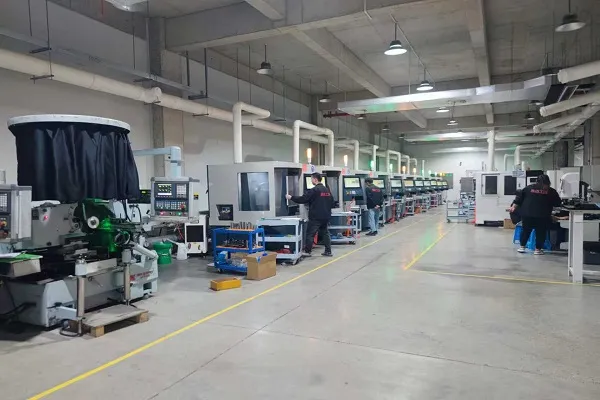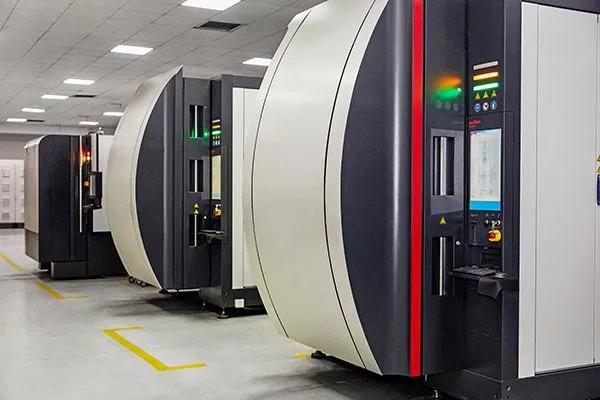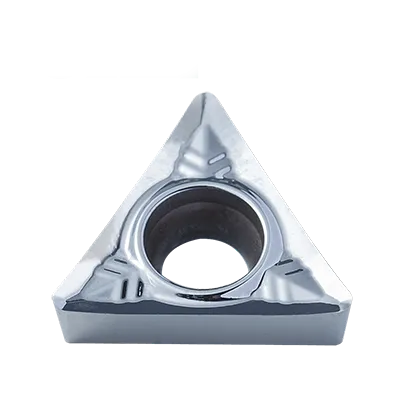
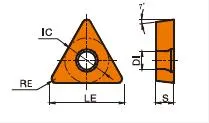
TCGXインサート
TCGX insert angle: 7° Positive Rake Insert with Chipbreaker;
Screw-On Insert, finishing geometry with high positive rake face for chip control in long chipping materials;
Triangle carbide insert; And a single-sided chip breaker;
Breaker Application: Finshing machining;
Matching Turning Tool Holder: STFCR/L ;
Range of TCGX insert types:TCGX0902/TCGX1102/TCGX16T3;
TCGX Insert can deal with multiple operations by combining different chip breakers and grades;
材料:タングステンカーバイド;
TCGX insert Meaning
Understanding the TCGX Insert Code
- T: Shape: Trigon (triangle)
- 子: Clearance Angle: 7 degrees (positive)
- G: 耐性:中容量は標準ですが、他の精密耐性が利用可能である可能性があります。
- ×: ブレーカ形式 & Hole Configuration. This letter designates the specific chipbreaker geometry and whether the insert has a hole or not.
- 数字:
- 最初の 2 桁: 内接円 (IC) の直径 (ミリメートル単位)。おおよそのインチ相当値を取得するには、この数値を 25.4 で割ります。
- 次の 2 桁: 厚さ(ミリメートル)。インチに変換するには、25.4 で割ります。
- 下 2 桁: ミリメートルのコーナー半径。インチに変換するには、25.4で除算します。
TCGX insert tool holder
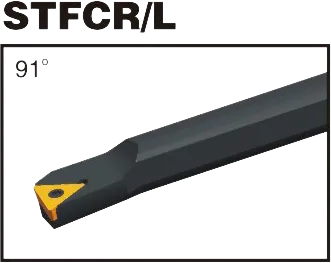
TCGX carbide Insert Dimensions (ISO)
| ISO指定 | 内接円 (IC) | 厚さ | コーナー半径 |
|---|---|---|---|
| TCGX 110202 | 11mm (0.433") | 2.38mm (0.094") | 0.2mm (0.008") |
| TCGX 110204 | 11mm (0.433") | 2.38mm (0.094") | 0.4mm (0.016") |
| TCGX 16T304 | 16mm (0.63") | 3.18mm (0.125") | 0.4mm (0.016") |
| TCGX 16T308 | 16mm (0.63") | 3.18mm (0.125") | 0.8mm (0.031") |
Example: TCGX 16T308
- Trigon (triangle) shape
- 7-degree positive clearance angle
- 中程度の耐性
- メーカー固有のチップブレーカーとホール構成
- 16mm inscribed circle diameter (approx. 0.63″ インチで)
- 厚さ3.18mm(約0.125mm)″ インチで)
- 0.8mmコーナー半径(約0.031″ インチ単位)。
The Science Behind Carbide Inserts: How They're Made and Why They're So Strong
超硬インサートは、入手可能な切削工具の中で最も多用途で耐久性のあるものの一部です。しかし、それらはどのように作られるのでしょうか?そして何が彼らをそんなに強いのでしょうか?このビデオでは、炭化タングステンの特性から製造プロセスまで、超硬インサートの背後にある科学を探求します。
当社の生産能力

